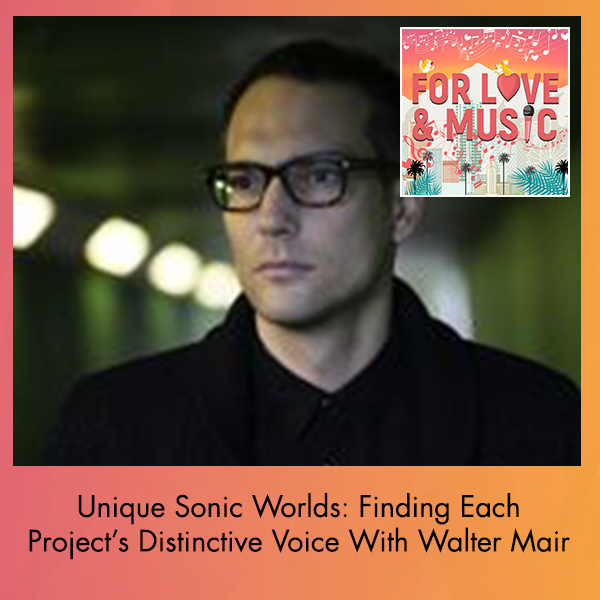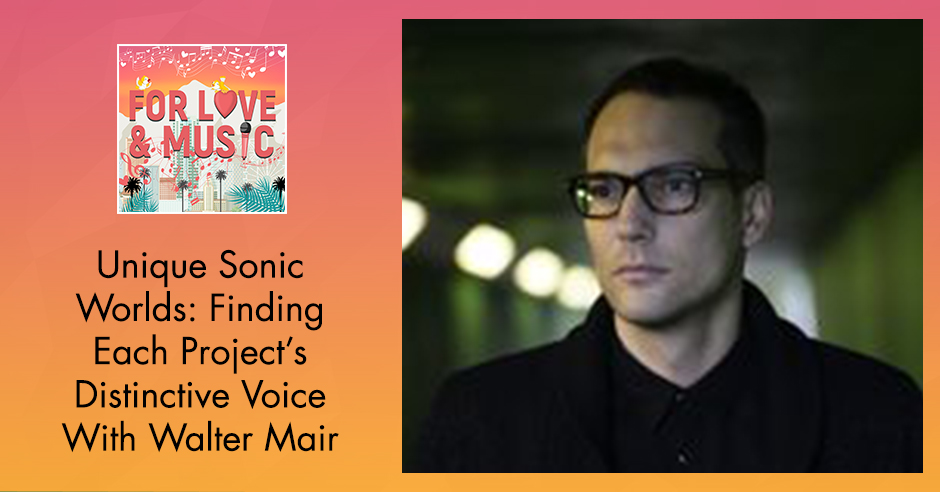
If you’ve ever played video games like Call of Duty: Mobile with your speakers or headphones on mute, you would understand how much of a difference the score makes in your gaming experience. Whether you enjoy consuming films, TV shows or video games, someone behind the scene worked hard to create that unique sonic world for you. That is what Austrian-born composer, Walter Mair does and he excels at it. Working from London, Walter is an Ivor Novello nominated and Telly Award-winning composer known for his eclectic approach in creating distinctive musical scores for a variety of projects, including the video game, Call of Duty Mobile, the psychological horror movie, The Unfamiliar and the Netflix docuseries, Formula 1: Drive to Survive. What is his approach on composing for such different genres? How does he create novel sounds that make each score distinctive? He answers these and more in this interview with Tara Joseph.
—
Listen to the podcast here:
Unique Sonic Worlds: Finding Each Project’s Distinctive Voice With Walter Mair
Our guest is an Ivor Novello nominated and Telly Award-winning composer, known for working on epic orchestrations to small ensemble and hybrid electronic pieces for film, TV and video games. Let’s welcome to the show, the fabulous Walter Mair. Walter, how are you?
Thank you. It’s very good to meet you.
You are in my hometown in London.
I am indeed. I’m not too far away from where you used to live here.
You were originally from Austria. How are you enjoying London?
When I moved here in 2006 or 2007, I made a conscious decision to move to London after having grown up in Austria and then having gone to a university there. I went to Germany to work there on feature films for almost two years and I decided to go to London, which for me is a help to be. It’s such a great city to be in Europe, considered working on projects within a reach distance to America.
Whereabouts in Austria were you born?
I was born surrounding Vienna. I was saying that if I was a Viennese composing, I’m from outside.
You’re incredibly talented and successful. Am I right in presuming that music came early into your life, that you were a very musical child or did you find it later as a teenager?
I started quite early on. My mom used to be a singing teacher and as such, she often gave lessons to gifted students at home in our house. I was surrounded with music all the time. There was a piano in my child’s room. I start playing the piano at the age of 3.5 years. I had no idea what I’m doing. I broke one hand off to the other, very much to the annoyance of my mom. You play along songs from Queen or John which is played along on the radio, on the piano. You get an idea of how this instrument works. My parents supported me. I had a few lessons and then I started trumpets.
You’re a multi-instrumentalist?
I would say a trumpet and piano, and that’s roughly it. I stopped playing the trumpet because when you’re in your teenage years, the trumpet is not the coolest instrument. You would rather play drums and guitar. At that time, I swapped to piano. I can play that and enhance it with techniques and skills. That’s where it all started. I bought myself a synthesizer when I was sixteen, an old school analog synthesizer. That’s what got me into writing music, to play with the instruments, produce some sounds, and see how it goes.
What was the first piece of music you ever composed?
It was from my thesis at the end of high school, a piece that was part of my thesis. One of the majors that I went through is music. I had to write the song and analyze. It was in the style of Maurice Ravel’s Boléro. It’s something that builds overtime. Overtime, more instruments come in. That’s when I realized, it’s good to be doing that and maybe focusing my career on that.
Each project needs a specific voice. A composer needs to be as genuine and unique as possible in describing the project with their music. Click To TweetYou work with big orchestras and you also work in a more intimate setting. Do you have a preference to either or do you love working in a variety of ways?
It’s definitely the latter. I like to express myself musically. It can be anything from like tiny nuanced, to turn on the few electronic sense on the side, or it can be as big as an 80-piece orchestra and 40-piece choir, which I’ve done a few times. It’s more finding a voice for each project, try to be as genuine and as unique in a way to describe the project with your music.
You have worked on numerous different projects and you won two Telly Awards, Best Original Music for the scores for the BAFTA EE Mobile Game of the Year, Call of Duty mobile, as well as the score for the Netflix docuseries Formula 1: Drive to Survive. Those are very different genres. What’s the process and how do you go from one to the other?
You have to distill which project needs what requirements? What instruments? Is it an electronic score? Is it an acoustic score, string quartet or big orchestra? I usually have a spotting session like every composer has with directors. In that session, we talk about the use of music and sometimes he or she would use temp music. It is the red flag. It’s like, “Let’s not go to temp score because we want to be unique and find our own voice.” Sometimes, it’s helpful to have at least something to grasp on to say, “The director uses this and that score for a specific reason.” I try to decipher whether they’re using a specific track as a temp track, as a guide for the composer.
I take away, it could be instrumentation, or the tempo, or the energy and then I decipher that and make my own thing of that, which could be totally different. I figure out from an 80-piece orchestral pick in your face score to something different and intimate. Maybe it’s the lyric melody the director liked. The rest is blowing up out of proportion. They never liked that. It’s those early conversations that are very creative. I like doing that and having the director over. At that stage, he’s been through quite a lot. He’s been watched around from producers, from execs. He had a long day in the edits, and then usually in the evening, he comes to me in the studio. We talk about different directions and what we can do. I try to keep my studio as a safe haven for directors. They come in. They know they can lay down on the couch and chill for 5 or 10 minutes.
You’ve got a bit of a headspace thing going on.
The directors when they come in are hyped up because their day has been busy. They might’ve been to the edit or something else. There are lots going on in their minds. When it comes to music, which is emotionally driven, I want them to have a good time, have a quick sip of coffee, sit down on the couch, relax for 5 to 10 minutes, checking emails and read it. We go into the art and then we start the process.
I’ve read that your sound is described as creativity with genuine sounds, experimenting with unique sonic worlds for each of your projects using an extensive collection of your analog-digital sense and blending live orchestra arrangements with experimental post-recording techniques. Would you sum it all up?
I try to find the fun on something you find in your studio. It could be an instrument. It could be anything. You put a tone with that and you see where it leads you. It could be a synthesizer, then it’s quite concrete. What are you going to do with that? It could be an instrument. I had import it from Asia or South Africa or somewhere that I’ve never played before. I’m naive. I take the instrument and produce some tunes. I would watch a YouTube video to see how roughly it works. Get fun on the way because I don’t have a preconception to the instrument. It’s like a toddler thing with a new toy that they found.
What about YouTube university? We use that all the time, but not for anything nearly as creative as you use it for. Anything that you need to learn, if you go onto YouTube, someone’s done it and someone can help you.
Someone’s done it better so you learn a lot.
One of your more projects is the psychological horror movie, The Unfamiliar. Tell me about that process. I’ve heard some of the music from the movie and the music gives you the element of terror to add along with the visuals that you’re watching. It’s brilliantly scored. Congratulations for that. I’m sure it will be well received. I was watching some of the movies. My wife and I were sitting there and the music was terrifying us a lot more of the time than what we were watching on the screen but a beautiful complement to one another.
That was a very interesting journey. I met a producer and director. We got to talk about their movie. They’re like, “We shot that and we are going to edit. If you want to come along and have a listen.” That’s what I did. I had a quick look at the film at the early stages and they hadn’t committed a composer at that stage. We discussed the temp score again, lights in there. I know why it’s in there, but it can be quite unique and different. I had the idea of saying, “Because of the topic and because of what the film is about, being possessed and what that means, why don’t we use elite instruments, a cello and treat it quite badly with different effects? Playing it at the metal side of bow instead of a horse hair, anything just like that and it sparked.” When I received the first edit, I thought, “No, the cellos weren’t cutting it. We need something bigger, bassier, and heavier.”
I decided that the cello doesn’t cut it. It need something a bit more bassier, bigger and darker. I decided to look it up on the internet. I found this instrument builder in Switzerland to produce us an octobass, which is like double the size of a double bass. The double bass is quite big in an orchestric view. I had that bass. It wouldn’t fit into my studio. I had this booth built. It’s based on that and an octobass. It’s not an original octobass. It’s a very large double bass. The string is almost the size of a finger. When I tried to get it shipped to London, it didn’t work because of restrictions and they would have been super expensive.
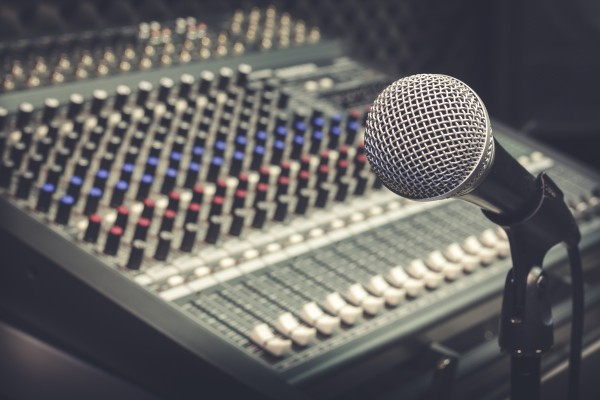
I had a friend of mine’s assistance at that time in Austria to go to Switzerland, pick it up, then I flew to Austria to record it there. I thought the next best move to London is go to Austria, which is close to Switzerland. The instrument was built and custom-made. I spent 1 or 2 weeks there and sample everything, play it, hammer it, use mallets. I even mounted metal chains onto the strings and tape the strings because they started resonating that create this very drawn and basic out of valley sound, yet it has this organic texture to it.
Where is that instrument now?
It’s still in Austria. I can’t move it anywhere. It’s still in a friend’s parents’ house and they hate him for that.
It sounds like it needs to be in a museum for musical instruments?
It should be. There are few octobasses that are in museums. I looked it up the other day. There is one in Denmark. My instrument even though it’s large and massive, it’s not quite as large as the real octobass. You can still transport it, but you would need a big van for that.
We’ve all been living through the time of Coronavirus and we’ve all been in lockdown. How has your COVID been so far in a creative capacity? I presume you’re in a home studio now? For the readers out there, Walter is in a studio with lots of equipment around him. Is that your home studio or is that an out-of-home studio?
I’ve got two studios and one is in Soho. It’s good for clients to come in. My second studio is at home, which is more of my creative hub. It’s like unlooked sense and modern sense.
Is that where you’ve based yourself during the whole pandemic?
It’s easy to be creative here and work. You couldn’t go to Soho. Lockdown and social distancing didn’t allow that. I didn’t want to take any risks. It’s a great place to write music.
How has your creative process changed during this time, or is it the same?
It’s the same. I’m lucky because I had a project that led into lockdown that meant I wouldn’t have to think about what I’m doing and how to change things because after necessity of finishing a soundtrack, I would have to do the best I can. Not to think twice. Once I finished this project, I was done going through this stage of, “What do you do next? How can you go about going to serve or to the studio? How do I make this work?” To be honest, I find it quite easy from a creativity point of view. As soon as I go into my studio here, I can close the door behind me. I have a safe environment. This is my creative space. I’m going to go outside, go into the garden and do anything else but this is my sanctuary.
Are there directors out there that you would still love to work with? Do you have a top three or four of people you would adore to be creative with?
There are quite a few directors out there, some of them have a very specific look and feel and the way to use the music. For instance, David Fincher’s use of the music in Social Network was a breakthrough in terms of how he used music. He nominated and won the Oscar for the score. The director of that scope of that upper echelon, a person like him can push through the boundaries and encourage composers to do something new or fresh or different. I liked doing that at the same time. I love independent directors who are yet to breakthrough because they’re a bit more rock and roll. Anything is possible. They don’t have those restrictions yet because they don’t work with a big studio. You want to keep the balance between working with established directors and up and coming and rising talents.
Do you know what your next project is going to be?
To break into the composing or producing arena, it’s not enough to have talent. You’ve got to go out there and not take no for an answer. Click To TweetYes, I do. It’s a sci-fi thriller, partly shot in London and in Thailand. It looks gorgeous. Each frame is like from a commercial. It looks perfect and the story is good.
Have you already started on that or not yet?
We had the spotting session and from the earliest stage of writing the music for that.
In your spotting stage, when would you expect your full score to be finished?
This one is different because I’m an input early on. They still have to do a few days of shooting because of Corona, everything was locked down. In a few weeks, they’re going to go back and edit. This a very early stage where you draft a few ideas. You send it to the director. He might use it in the assembly edits and play with that. It is a very early on creative approach and it’s quite nice for change because often you come in at the last hour.
Do you know where we’ll be able to see this project when it comes out or is that top secret too?
It’s definitely coming in 2021.
Is it TV or film?
It’s a proper feature. It has a good cast. I’m excited about it. It’s a very now an in-cast state, the lead actress from Netflix.
This podcast is called For Love and Music because those are the two reasons that I moved to LA. One is because I fell madly in love and two, because for me, I felt that the music industry epicenter was very much here in LA. I always ask everyone this question, has love ever guided you to make an unexpected career decision?
I wouldn’t be in London if it wasn’t for my wife. It is because both of us had a different journey beforehand. I studied medicine before I went into music. I had a few years there. I was a bit more senior when I went into composition. You don’t want to waste any time.
What does your wife do?
She’s the head of art in a big advertising agency which is quite nice because the other partner understands when there’s crunch time.
Do you have a song that resonates romantically with you both?
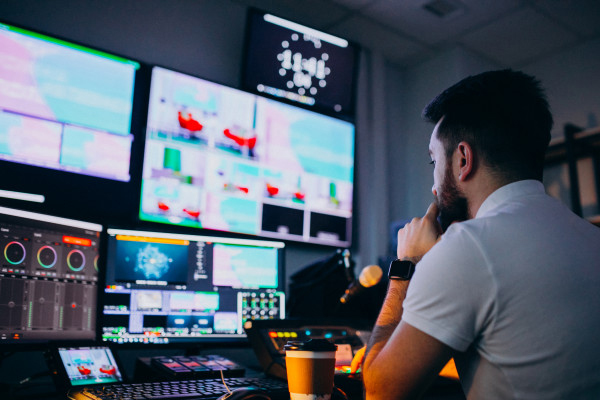
We missed on that because when we got together, I was myself and Nikki listened more to, have you missing was like, “We definitely have to find a bridge to get.”
Did you find that gap? Did you find that song or still working on it?
I’m hooked on film music, which is a bit more repetitive, interesting like Ludovico Einaudi, Philip Glass, Max Richter. She loves listening to these compositions.
Do you play your music to her before you send it off to the various clients that you work for or do you get on with it and show her afterwards or she hears it on the film or TV show?
I have many times from even big established composers, you still feel like insecure when the music is finished. You’re like, “You play it directly and see how it goes.” I wouldn’t even want to share it with others. Once it’s out there, it’s available in the city, then, “You’ve done it, tick the box, everything’s fine.” Sometimes I play her a cue or I play in this a stereo hi-fi, she would listen to it and say, “I like it.” I’m like, “It’s from me.”
It’s hard or isn’t it to share things with your nearest and dearest because their opinion matters so much.
Even without saying a thing, you would know how she would feel about the music, which makes me second guessing if that’s the way music should be, maybe we should change something.
How would you like the next 5 to 10 years to pan out for you? What are your aspirations?
I would like to keep working on creative briefs. There’s nothing more boring than if someone sends you temps and says, “Can you cut it out?” It’s not a job for me. I would like to bring this up into each job. It’s like you said, define the song and the sound for each project. I would grow to work on bigger projects, at the same time, keep working in different. It’s a nice balance of different capacities, firms, high budget, low budget, everything in between, keep it challenging and interesting.
For those readers out there who may be dreaming of wanting to be a composer or a producer, what advice would you give? You have to have talent, but what advice would you give to break into that arena? It’s not easy. A lot of people want to be composers and work on amazing movies and have the talent, but never get the break. What are your tips for the top?
I know amazing turns, like producers, songwriters and composers who sit in their basements writing the most amazing music on their laptops because there are only these days in which is interesting music. They don’t get the chance to go out and find and meet people. I would always encourage people to say, “The more you go out and even if you’re an introvert, push yourself, at least once or twice a week to go outside and meet someone.” In London, it’s easy as pop culture, you meet producers, directors, hang out somewhere in Soho or any other place. Go out, meet music supervisors, directors, talk to them and have a loose conversation with those breaches, and something comes back. Push yourself to go out there and if you hear no, don’t take no for an answer. There’s always like, “We’ve met six months ago. Do you remember? I’ve written this amazing piece, have a listen.” Maybe it fits in there looking for someone at this very moment.
It’s perseverance and hard work. Not taking no is the definitive answer. In any part of the entertainment industry, whether you’re a composer or an actor, there are a whole load of knock-backs before you get that yes, the opportunity to move forward. You must always keep on going. Thank you so much. You’ve been an amazing guest. I’m excited to see and listen to the next projects that you’ll be working on. You come back on the show to promote your top-secret projects and any offers that you might have. I hope you stay safe and healthy during these crazy times.
Thank you for having me. Have a great time. Stay safe and healthy throughout this entire time.
Important Links:
About Walter Mair
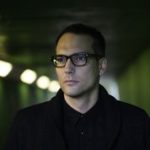 Award-winning, London-based composer, Walter Mair has become known for his captivating original scores, whether they be in feature films, television dramas, or narrative-driven interactive entertainment. His most recent project being the highly acclaimed Netflix original series, Formula 1:Drive to Survive from the Academy Award-winning producers of Amy and Senna. The show was described by The Guardian as “fascinating” and ESPN went on to call it “captivating”. Some of Mair’s upcoming projects include HBO’s feature documentary, Unmasking Jihadi John, directed by the Emmy and triple BAFTA-winning Anthony Wonke. Along with the horror/thriller, The Unfamiliar, and the drama, Balance Not Symmetry, which was recorded at the legendary Abbey Road Studio and mixed by veteran Geoff Foster, whose credits include Inception and The Dark Knight.
Award-winning, London-based composer, Walter Mair has become known for his captivating original scores, whether they be in feature films, television dramas, or narrative-driven interactive entertainment. His most recent project being the highly acclaimed Netflix original series, Formula 1:Drive to Survive from the Academy Award-winning producers of Amy and Senna. The show was described by The Guardian as “fascinating” and ESPN went on to call it “captivating”. Some of Mair’s upcoming projects include HBO’s feature documentary, Unmasking Jihadi John, directed by the Emmy and triple BAFTA-winning Anthony Wonke. Along with the horror/thriller, The Unfamiliar, and the drama, Balance Not Symmetry, which was recorded at the legendary Abbey Road Studio and mixed by veteran Geoff Foster, whose credits include Inception and The Dark Knight.
His extensive body of work ranges from epic full orchestral scores recorded with 80-piece orchestras to the intimate, small ensemble and hybrid electronic scores, such as Toby Tobias’ thriller Blood Orange starring Ben Lamb and Iggy Pop; and edgy television drama series such as BBC 1’s Cuffs from the producers of Ripper Street and E4’s teen drama series Glue written by 5 time BAFTA-winner Jack Thorne. His music can also be heard in Rockstar’s Grand Theft Auto video games, Sony’s sci-fi franchise Killzone, Tom Clancy’s Splinter Cell: Conviction, Netflix’s The Same Sky, Adam Morse’s thriller Lucid and The Creative Assembly’s Total War series. He also notably wrote original music for Ryan Gosling’s directorial debut, Lost River, which premiered at the 2014 Cannes Film Festival.
Walter maintains a state-of-the-art recording studio in London’s SoHo, is a member of the British Academy of Film and Television (BAFTA) and BASCA.

